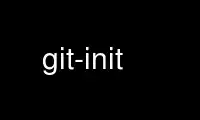
This is the command git-init that can be run in the OnWorks free hosting provider using one of our multiple free online workstations such as Ubuntu Online, Fedora Online, Windows online emulator or MAC OS online emulator
PROGRAM:
NAME
git-init - Create an empty Git repository or reinitialize an existing one
SYNOPSIS
git init [-q | --quiet] [--bare] [--template=<template_directory>]
[--separate-git-dir <git dir>]
[--shared[=<permissions>]] [directory]
DESCRIPTION
This command creates an empty Git repository - basically a .git directory with
subdirectories for objects, refs/heads, refs/tags, and template files. An initial HEAD
file that references the HEAD of the master branch is also created.
If the $GIT_DIR environment variable is set then it specifies a path to use instead of
./.git for the base of the repository.
If the object storage directory is specified via the $GIT_OBJECT_DIRECTORY environment
variable then the sha1 directories are created underneath - otherwise the default
$GIT_DIR/objects directory is used.
Running git init in an existing repository is safe. It will not overwrite things that are
already there. The primary reason for rerunning git init is to pick up newly added
templates (or to move the repository to another place if --separate-git-dir is given).
OPTIONS
-q, --quiet
Only print error and warning messages; all other output will be suppressed.
--bare
Create a bare repository. If GIT_DIR environment is not set, it is set to the current
working directory.
--template=<template_directory>
Specify the directory from which templates will be used. (See the "TEMPLATE DIRECTORY"
section below.)
--separate-git-dir=<git dir>
Instead of initializing the repository as a directory to either $GIT_DIR or ./.git/,
create a text file there containing the path to the actual repository. This file acts
as filesystem-agnostic Git symbolic link to the repository.
If this is reinitialization, the repository will be moved to the specified path.
--shared[=(false|true|umask|group|all|world|everybody|0xxx)]
Specify that the Git repository is to be shared amongst several users. This allows
users belonging to the same group to push into that repository. When specified, the
config variable "core.sharedRepository" is set so that files and directories under
$GIT_DIR are created with the requested permissions. When not specified, Git will use
permissions reported by umask(2).
The option can have the following values, defaulting to group if no value is given:
umask (or false)
Use permissions reported by umask(2). The default, when --shared is not specified.
group (or true)
Make the repository group-writable, (and g+sx, since the git group may be not the
primary group of all users). This is used to loosen the permissions of an
otherwise safe umask(2) value. Note that the umask still applies to the other
permission bits (e.g. if umask is 0022, using group will not remove read
privileges from other (non-group) users). See 0xxx for how to exactly specify the
repository permissions.
all (or world or everybody)
Same as group, but make the repository readable by all users.
0xxx
0xxx is an octal number and each file will have mode 0xxx. 0xxx will override
users' umask(2) value (and not only loosen permissions as group and all does).
0640 will create a repository which is group-readable, but not group-writable or
accessible to others. 0660 will create a repo that is readable and writable to
the current user and group, but inaccessible to others.
By default, the configuration flag receive.denyNonFastForwards is enabled in shared
repositories, so that you cannot force a non fast-forwarding push into it.
If you provide a directory, the command is run inside it. If this directory does not
exist, it will be created.
TEMPLATE DIRECTORY
The template directory contains files and directories that will be copied to the $GIT_DIR
after it is created.
The template directory will be one of the following (in order):
· the argument given with the --template option;
· the contents of the $GIT_TEMPLATE_DIR environment variable;
· the init.templateDir configuration variable; or
· the default template directory: /usr/share/git-core/templates.
The default template directory includes some directory structure, suggested "exclude
patterns" (see gitignore(5)), and sample hook files (see githooks(5)).
EXAMPLES
Start a new Git repository for an existing code base
$ cd /path/to/my/codebase
$ git init (1)
$ git add . (2)
$ git commit (3)
1. Create a /path/to/my/codebase/.git directory.
2. Add all existing files to the index.
3. Record the pristine state as the first commit in the history.
GIT
Part of the git(1) suite
Use git-init online using onworks.net services
